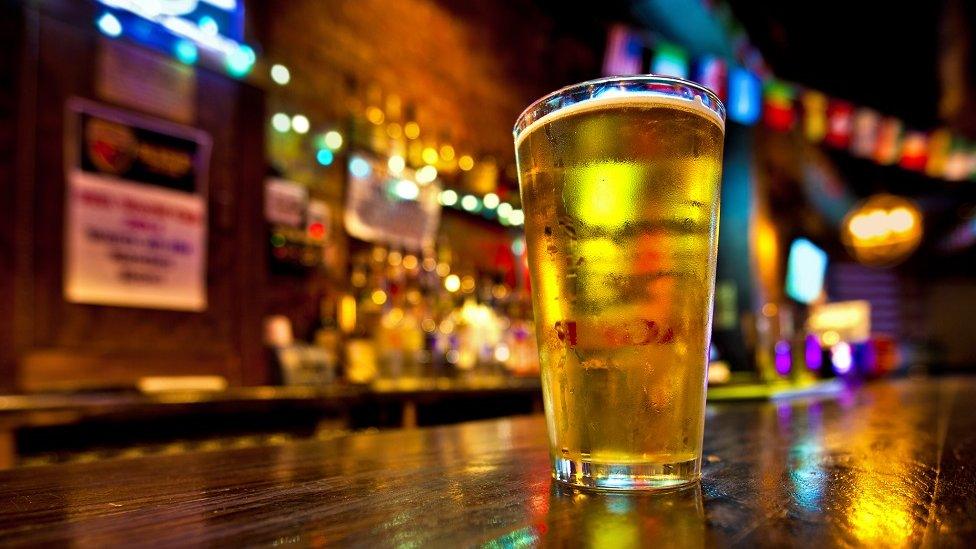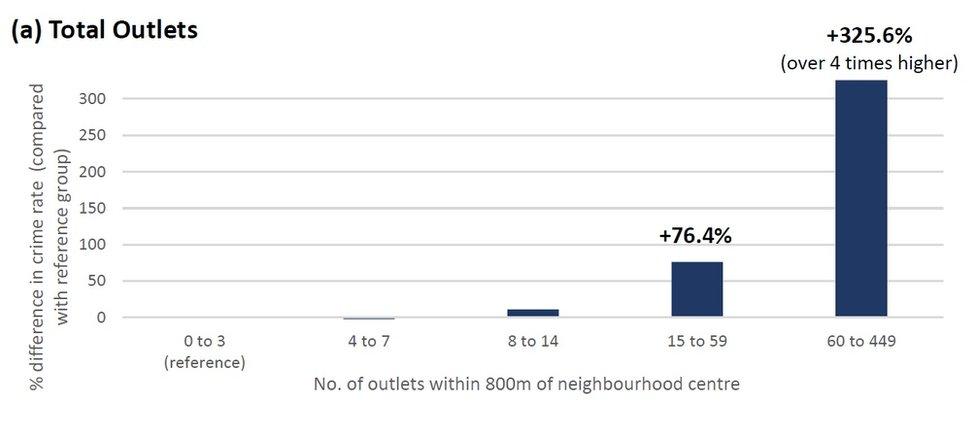'Higher crime' in areas where alcohol is most available, says study
- Published
- comments

Crime rates were highest in areas where there are a large number of pubs, clubs and shops selling alcohol, according to a new report.
Researchers found neighbourhoods in Aberdeen, Moray and South Ayrshire were among those with highest crime rates.
In those regions crime rates are almost eight times higher in areas with the most alcohol outlets, compared with those with the least.
Alcohol Focus Scotland called for action on the availability of alcohol.
The charity said the information in the report should be used by local licensing boards to curb any increase in licensed premises in problem areas.
And it said the new research should inform Scottish government policy on preventing harm by alcohol.
The report compared neighbourhoods with the highest number of licensed premises across Scotland to those with the least.
It found that, in those with the most pubs, clubs and off-licences:
Crime rates were, on average, four times higher
Alcohol-related deaths were twice as high
Alcohol-related hospitalisation rates were almost twice as high.
But it also discovered an even more worrying picture at local levels:
In Dundee City and East Ayrshire, the alcohol-related death rate is almost five times higher
In parts of East Lothian, the alcohol-related death rate is almost four times higher
Alcohol-related hospitalisations are more than four times higher in parts of Argyll and Bute
In Perth and Kinross and South Ayrshire, alcohol-related hospitalisations are almost four times higher.
The researchers from the Centre for Research on Environment, Society and Health (CRESH) also found that there were 40% more alcohol outlets in the most deprived neighbourhoods than in the wealthiest parts of the country.
They found a relationship between alcohol availability and harm even when other factors such as age, sex, and income deprivation had been taken into account.

The crime rate is four times higher in neighbourhoods with the highest number of licensed premises
It comes after the Scottish government introduced a minimum price for alcohol sold north of the border.
Alison Douglas, the chief executive of Alcohol Focus Scotland said it was time to take action on how "readily available" alcohol is in Scotland.
She added: "The implementation of minimum unit pricing will save the lives of hundreds of Scots, but if we are to truly turn the tide of our alcohol problem tackling availability must also be part of the mix.
"This new research should be used to help inform the Scottish government's next steps on alcohol prevention which are due to be published this summer."
She added: "The research will also be valuable for licensing boards who are the cornerstone of locally-led systems for controlling alcohol availability.
"Boards are responsible for promoting the licensing objectives, including preventing crime and disorder and protecting and improving public health.
"The local evidence will help them assess the overprovision of licensed premises in their areas.
"There is no action that a licensing board can take to reduce the number of licensed premises, however, they do have the ability to prevent further increases.
"It is their duty to act in the public interest and where their communities are suffering, they should be applying the brakes."

Leading voices in healthcare and crime prevention echoed the charity's demands following the publication of the report.
Will Linden, the acting director of the Scottish Violence Reduction Unit, said: "We know that Scotland has a toxic relationship with alcohol that fills up our A&E departments and prisons. Around half of violent crime in Scotland is linked to alcohol.
"We must address the current over provision of alcohol in our towns and cities and create a more positive environment for everyone, especially our children.
"The licensing system has a crucial role to play in creating safe and healthy communities. We all pick up the tab for alcohol harm."
Dr Tara Shivaji, consultant in public health with NHS Grampian, said one in four people in Scotland drink at potentially harmful levels.
She said: "While many in public health are working to minimise alcohol consumption and harm, we live in an environment that normalises and encourages consumption through marketing and increased access.
"We must consider the impact of the overall availability of alcohol in Scotland and address the overprovision of alcohol in areas with high levels of alcohol-related harm."
- Published21 March 2018
